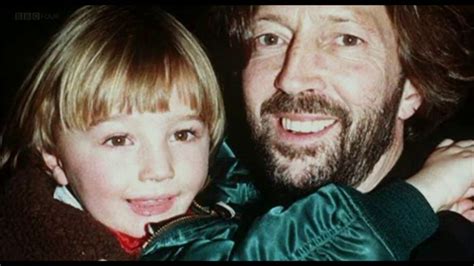The untimely and tragic death of Eric Clapton’s four-year-old son, Conor, is a poignant reminder of the devastating consequences of accidental injuries and the profound impact they can have on families. On March 20, 1991, Conor Clapton fell from a window on the 53rd floor of a New York City high-rise building, resulting in his immediate death. This heartbreaking incident not only shook the music world but also had a profound effect on Eric Clapton’s life and career.
Background and Circumstances
Conor Clapton was the son of Eric Clapton and Italian model Lory Del Santo. Born on August 21, 1986, Conor’s life was marked by the intense media scrutiny that often accompanies the children of celebrities. Despite this, his parents sought to provide him with as normal a life as possible, balancing their careers with family responsibilities. The circumstances surrounding Conor’s death were particularly devastating due to the accidental nature of the incident. A window in the apartment, which was supposed to have been secured, was found to be open, allowing Conor to fall out. This tragedy highlighted issues of building safety and the importance of ensuring that all safety measures are in place, especially in high-rise buildings.
Impact on Eric Clapton
The loss of his son had a profound impact on Eric Clapton, both personally and professionally. Clapton has spoken publicly about the immense grief and sense of guilt he felt following Conor’s death. This period marked a significant change in his music, as he began to express his grief and reflections through his songs. One of the most notable examples of this is the song “Tears in Heaven,” which Clapton wrote as a tribute to his son. This ballad, with its poignant lyrics and soaring melody, captures the essence of a parent’s grief and longing for a lost child. “Tears in Heaven” has become one of Clapton’s most beloved and enduring songs, a testament to the transformative power of music to express and heal emotional pain.
Musical Expression of Grief
The album “Unplugged,” released in 1992, features “Tears in Heaven” and is a powerful example of how music can serve as a medium for expressing and dealing with profound personal loss. This acoustic performance, part of the MTV Unplugged series, showcased Clapton’s ability to convey deep emotional pain through his music, reaching a wide audience and helping many to understand and connect with his experience. The success of “Unplugged” and the impact of “Tears in Heaven” underscore the role of music as a universal language, capable of transcending personal boundaries and speaking directly to the heart.
Legacy and Remembrance
Conor Clapton’s legacy lives on through the music inspired by his memory and the impact his life had on his father’s career. Eric Clapton’s journey through grief, while intensely personal, has also been publicly shared, offering a glimpse into the healing process and the power of love and memory to transcend even the most profound of losses. The establishment of the Crossroads Centre, a rehabilitation facility founded by Eric Clapton, is also a testament to his commitment to creating positive change and helping others, inspired in part by his experiences and the lessons learned from his son’s life and death.
FAQ Section
What was the cause of Conor Clapton's death?
+Conor Clapton died after falling from a window on the 53rd floor of a New York City high-rise building. The window, which was supposed to have been secured, was found to be open.
How did Eric Clapton's music reflect his grief after Conor's death?
+Eric Clapton's music, particularly the song "Tears in Heaven" and the album "Unplugged," reflected his deep emotional pain and grief. These works are testaments to the transformative power of music to express and heal emotional wounds.
What legacy has Conor Clapton left behind?
+Conor Clapton's legacy is seen in the music his father created in his memory, such as "Tears in Heaven," and in the impact his life had on Eric Clapton's career and personal journey. His memory continues to inspire and influence Eric Clapton's work and charitable endeavors.
Conclusion
The story of Conor Clapton and its impact on Eric Clapton is a powerful reminder of the fragility of life and the profound effects of personal tragedy. Through his music, Eric Clapton has shared his grief and healing process with the world, creating a legacy for his son that extends far beyond their personal experience, touching the hearts of millions and inspiring a deeper understanding of love, loss, and the transformative power of music.



